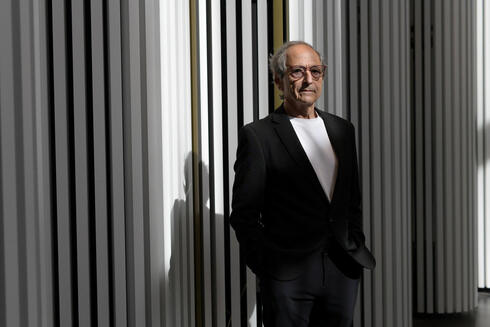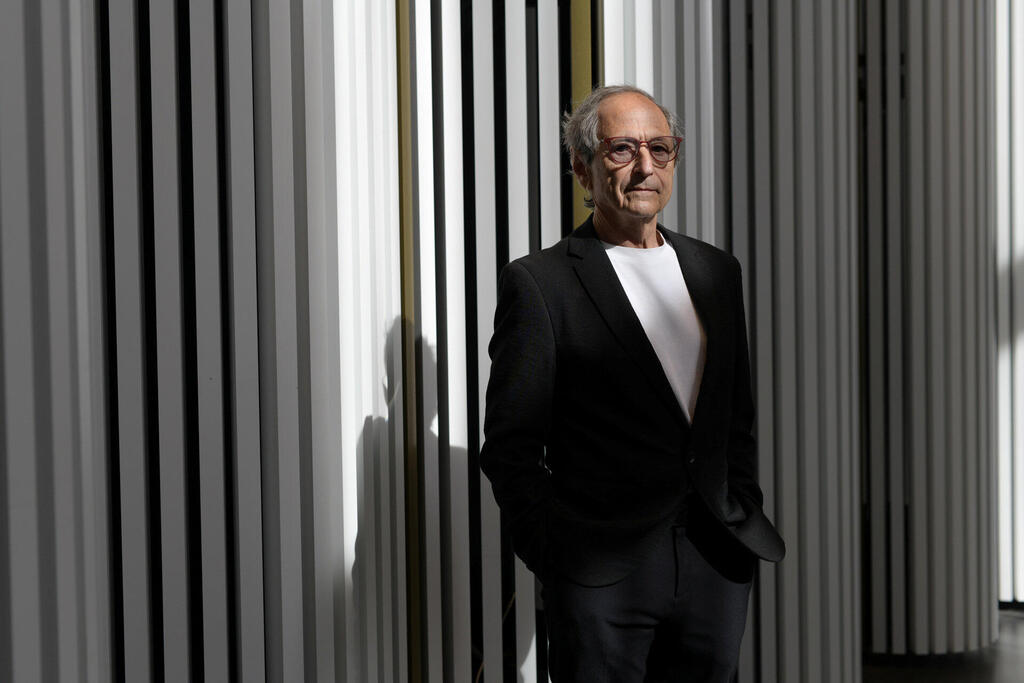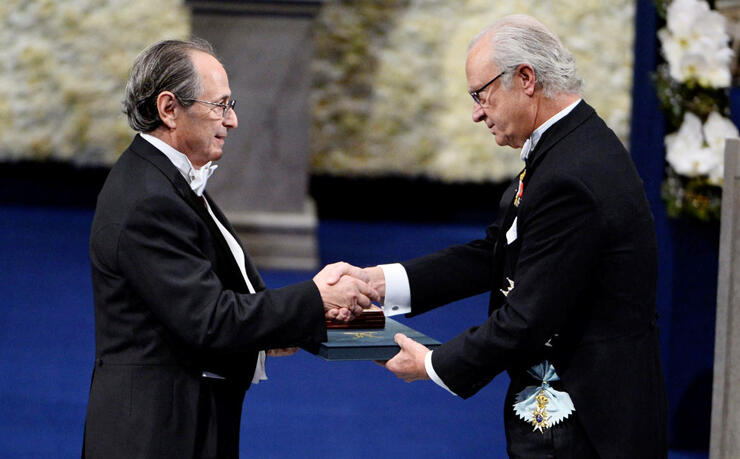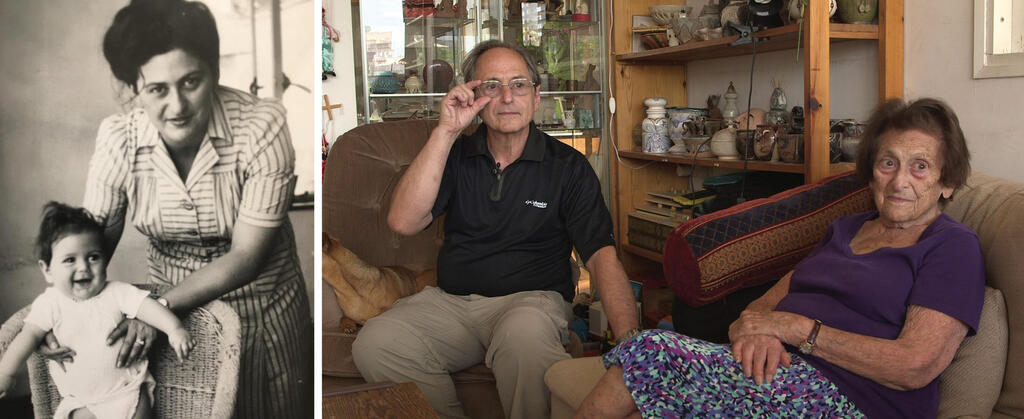
Take it or Levitt: A Nobel Prize winner’s winding road to the top
Prof. Michael Levitt talks about his unconventional life path, from childhood in South Africa with a single mother, emigrating to England, and finding logic in the chaos of nature.
"In life, you have to want to fail," says Professor Michael Levitt. "School doesn't teach you that. But if you try to do hard things in life, you have to fail. Otherwise, it's like telling your child, 'I want you to learn to walk, but if you fall once, that's the end.' He'll never learn to walk, nor ride a bike. So if you meet someone who tells you, 'I've never failed at anything,' you can only conclude that they've never tried to do anything hard in their life."
These words come from a man who has succeeded by any measure. Levitt is a 2013 Nobel Prize winner in Chemistry, a professor of computational biology at Stanford University, a fellow of the International Computational Biology Association, and a member of the National Academy of Sciences of the United States.
But Levitt (77) is an unconventional person, and his life path has been unconventional. He grew up with a single mother and became a world-renowned researcher; he received the Nobel Prize in Chemistry despite studying physics and earning a doctorate in biology; and he grew up in South Africa, was educated in Britain, but now divides his life between Israel, China, and the United States. "Shoshan, my wife, and I are like birds that migrate with the seasons," he says. In an interview with Calcalist, he talks in detail for the first time about his unique path to success.
"As a good scientist, you're always wrong," he explains. "I always say that a good scientist is wrong 90% of the time, but a really good scientist is wrong 99% of the time, because that means they're investigating very difficult things that we don't know the answer to. A good scientist is someone who understands that nature is much smarter than they are and that they're going to be wrong. So the only way to find out the truth is to try all sorts of different things and not think, 'This is definitely how it is.'"
Levitt also applied this concept to his own research, which revealed that there is logic and order in places in nature that previously seemed arbitrary. Working with Prof. Arieh Warshel and Prof. Martin Karplus, who shared the 2013 Nobel Prize with Levitt, they developed models for understanding complex chemical systems. "It's a computational technique that simulates the structure of DNA and the shapes of proteins in the body very accurately," Levitt explained in the past. "Just as every bridge or building built today is first subjected to an accurate computer simulation, so it is with proteins and DNA helices."
Simply put, proteins like hemoglobin and insulin have a unique structure determined by the order of their amino acids—a kind of puzzle that nature solves 24 hours a day, seven days a week. Given the right order, nature knows what the structure should be, and the protein folds into the correct shape. Levitt, Warshel, and Karplus developed tools that allow this process to be simulated on a computer.
A Bachelor's Degree Instead of Deteriorating into Snooker
Levitt was born in Pretoria, South Africa, the eldest son of Gertrude, the daughter of a Czech immigrant, and Nathan, who immigrated there as a child from Palanga, Lithuania. "The Lithuanians were the majority in the Jewish community in South Africa, and they were strong," he says. "I think my mother, who was a minority, really wanted to marry a Lithuanian, and so she did."
His father, Nathan, suffered from depression and never found fulfillment in his career. "He studied law, but he just didn’t like being a lawyer," says Levitt. "He was an intellectual, but his family, who had a wholesale leather business and wanted him to join it, didn’t like it. He would probably have enjoyed being a scientist or a philosopher."
The marriage deteriorated when Michael was 8. "I grew up in a stable home with my mother, without my father," he says. "It was a bad divorce. When I visited my father, he would just complain about my mother." The relationship between the two gradually weakened and wasn’t renewed until Levitt was in his forties. His mother had to raise three young children alone in difficult circumstances, but she was determined to give her children what she herself didn’t receive: an education.
"My mother was the third sibling in the family," Levitt says. "Her parents gave most of the education to her older brother and sister, and her studies were interrupted when she was 14. Later, she studied accounting in college, simply to acquire a useful profession, and it served her well throughout her life. She always knew exactly how much money she had in the bank, which made her very generous because she knew exactly what she could give." Contrary to what one might expect, the young Levitt was not a bookworm. "I was much more interested in girls than in math and physics. In fact, I didn’t really read books until I was 25," he says. He tells the Nobel Prize website, "School was fun, but not particularly challenging."
The trouble began at age 14, when Levitt discovered snooker. "The problem was that snooker is usually played in bars, and those aren’t very nice places. I didn’t drink there, because I was a pretty naive kid, but one night I suddenly came home at 3:00 in the morning. My mother didn’t like it, and she was really worried. I didn’t take into account that South Africa was dangerous at the time. I did stupid things, and she probably thought I might go off the rails."
This small incident set off a chain reaction that changed his life. He and his mother agreed that, since he was bored at school, he would complete his remaining two years of schooling during the summer vacation with private lessons and take the matriculation exams earlier than planned, in subjects he didn’t particularly like. "It was hard for her," he explains. "My mother didn’t have much money, and yet she spent a large percentage of what she had to give me a boost."
And what about you?
"It was a sensitive issue at home because I got most of her attention. My brother and sister are both academics, but sometimes the oldest child gets too much attention, as in the case of my mother and her siblings. It's something I didn’t notice at the time, only in retrospect." Four months later, before he turned 16, Levitt successfully completed his high school diploma. "I was a little surprised to discover how hard I wanted to work," he says. "I was very responsible."
During that time, he also met two brothers who would have a great influence on his life: Jules and Eddie Trump. "It all started when Eddie, who was 17 at the time, wasn’t allowed to take the high school exams because his grades weren’t good enough. And who was better suited than me, who was two whole years younger than him, to teach him?" he says with a smile. "I became his private tutor and helped him with math. He may have also gained confidence when he saw that someone as small as me could succeed. And I enjoyed it, because the Trumps were quite rich. They had a house with a pool, and Jules had a sports car. Years later, the brothers moved to New York and became the wealthy Trumps."
The two made their fortune mainly in the real estate business and continue to be generous donors to Israel. Among other things, Jules owns the Haifa Group (formerly Haifa Chemicals) through the holding company TRI. The brothers have no family connection to the president of the United States. Quite the opposite. "At one point, Donald Trump sued them because he wanted the name 'Trump Foundation' for himself," says Levitt. "But he lost and had to settle for the name 'Donald Trump Foundation.'"
The friendship between Levitt and the brothers continues to this day. "They have the best viewing box at the U.S. Open tennis championships, and every year I’m invited there," he says. "Once I met Dr. Ruth there, and another time, Chelsea Clinton." About six months ago, Levitt also joined the board of directors of the Trump Foundation for Education, a philanthropic foundation designed to help the Israeli education system curb its decline in excellence in math and science in high schools.
The Advantage of TV Addiction
Another push from Levitt's mother came in late 1963, when he was already a student of applied mathematics at the University of Pretoria. She bought him a plane ticket to London as a gift to visit her brother and his wife, both renowned scientists in their own right: Max Stern, who was credited with developing a vaccine for anthrax, and Tikva Alper, who discovered that the infectious agent in the mad cow virus is DNA, not protein.
Spending time with them instilled motivation and inspiration in Levitt, advancing his academic path. "Tikva said to me, 'Why go back to South Africa when you're already here? Maybe try to get into university here. At most, if you don’t get in, it will take you six months. You can always come back,'" he recalls. Levitt was convinced and enrolled at Acton Technical College, later studying physics at King's College.
What makes a 16-year-old leave home and decide to live with his uncles on a distant continent?
"I loved being there. It was my first time away from home, and my uncles were amazing people. They taught me how to drink coffee for the first time. I loved walking around the city on my own. I didn’t have any friends yet because I wasn’t in school yet. There was a jazz club right next to their house, and I saw Simon and Garfunkel perform there. But I think what really made me stay in the end was the television they had, especially the Kendrew show. It was a wonderful introduction to molecular biology. I became addicted to television."
The show in question was The Thread of Life, a series of filmed lectures by the recent Nobel Prize winner in Chemistry, John Kendrew, broadcast on the BBC. Levitt found himself glued to the screen. "I know at least five scientists whose lives were influenced by that show," he says. "What scientists have discovered about how life works is so amazing that if someone were to write a science fiction story about how, for example, molecules work like machines, no one would believe it."
You could also go back to studying science in South Africa.
"The education in South Africa was at a very low level at the time. Even though I had finished my first year at university there, I had to return to college in England to make up for the gaps in the level required in Britain.
"You also have to remember that the situation in South Africa during those years was very difficult. The police were killing many black people, and my friends were starting to leave. My mother must have thought about that. I guess she felt there was no future there for people who wanted to be scientists or intellectuals because, in South Africa, the most intellectual career you could pursue was to be a lawyer or a doctor. Many academics didn’t like apartheid, and a whole generation of young people left, especially Jews."
But it wasn’t just the young people who left. After a year in Britain, Levitt’s mother and brother also moved there. "My mother didn’t have any money then," he says. "She did receive child support from my father, but living in England was more expensive than in South Africa. She decided she wanted to be a teacher, but she didn’t have a high school diploma, except in Hebrew, so they placed her in religious studies. It was very funny because they always told her she seemed so interested in the story of the New Testament, and she wanted to tell them, 'Yes, this is the first time I’ve heard it.' After all, she was Jewish."
The Forbidden Novel That Gave Birth to a Career
In 1967, Levitt tried to join the prestigious molecular biology laboratory at Cambridge University, where four British Nobel laureates worked, including the television-admired Kendrew. However, there was no room in the lab, and he was rejected. Friends supported him, and on their recommendation, Levitt responded to Kendrew with a counter-offer, asking if there was a possibility of joining the lab a year later. Kendrew suggested he come for an interview, which went well, but made it clear that it would only be decided in a year whether he would be accepted.
Levitt did not give up and insisted on certainty, which led to a compromise: he would be accepted for a doctorate the following year, but in the meantime, he would find a one-year postdoctoral position at the Weizmann Institute to pass the time. This is how Levitt first arrived in Rehovot in October 1967.
Why the Weizmann Institute?
“A complete coincidence,” Levitt insists. “Kendrew was in love with Suzy Ambache, who later became Abba Eban’s wife,” he says. The two met in the early 1940s when Kendrew was sent to Palestine as a young officer in the Royal Air Force. “But because he was a gentile, her family didn’t like it.” According to Levitt, this was Kendrew’s incentive to establish ties with the Weizmann Institute, and he sat on its advisory board.
“The Weizmann Institute also had one of the largest computers in Europe at the time, and one of the people who built the first computer at Princeton was a Jew who had immigrated to Israel,” says Levitt. So, there was great benefit in sending an enthusiastic young scientist who also knew Hebrew to the institute.
Ten weeks after arriving in Rehovot, Levitt met Rina, who became his first wife and the mother of his three sons, at a Christmas party. "I married her at 21, we moved to Cambridge, and had children almost immediately," he says. "Scientist friends told me that if a scientist marries young, then he can work hard and get on the fast track to a career, because the problem of finding a girlfriend has already been solved. In my case specifically, it was wonderful that we also had children so quickly because one of the biggest problems with being young and energetic is that you work too much and burn out. And I really believe that all the research work that earned us the Nobel only benefited from me doing it when there was a child under three at home."
Levitt’s star rose in November 1969 when he published his first paper as a sole author in the prestigious journal Nature. The paper, submitted, reviewed, and published in a record time of just 23 days, dealt with a model he created of the transfer RNA (tRNA) molecule. "Later, the model turned out to be wrong," he says. "But at the time, it brought me a lot of fame. Suddenly, they started inviting me to speak at conferences. I was the first to discover that, like DNA, tRNA also has bases that connect to form pairs. In DNA, the connections are only within the helices (helical structures), but in tRNA, there are some that are not. This is the Levitt Basepad, thanks to which I am famous in certain circles."
How come you signed the paper as the sole author?
"Professor Francis Crick worked with me a lot on this paper, but he submitted it under my name only. I think the reason for this is that 16 years earlier, Professor Max Perutz did the same thing for him, with his groundbreaking paper as a doctoral student on the structure of DNA. Perutz believed that the future of science was to give young people independence and responsibility, and Crick passed that on. I still think to this day that this is the secret. One of the good things about this country is that the army gives young people independence and responsibility."
In 1972, Levitt returned to the Weizmann Institute, where a significant portion of the research (three out of eight years) that ultimately won him the Nobel Prize was conducted. He spent the next few years alternating between the Weizmann Institute and Cambridge. In 1977, he moved to California for a second postdoctoral fellowship alongside Crick at the Salk Institute, and after two years, he returned to Israel. “Rina wanted to be closer to family, and I was looking forward to the warmer climate,” he wrote on the Nobel Prize website. The family settled in Rehovot, and Levitt took a position at the Weizmann Institute.
In 1986, Levitt took a sabbatical in Cambridge, and then the offer from Stanford Medical School arrived, where he is still a professor. His research is multifaceted, focusing on RNA and Covid. Today, Levitt lives in Tel Aviv for four months a year with his second wife, Dr. Shoshan Brosh-Levitt, an expert in written and visual literacy and curator of exhibitions featuring Israeli and Chinese artists in both countries.
Do you feel Israeli?
"I feel Jewish. I am proud to be Jewish and proud to be Israeli, but I still feel foreign, even though it has been almost 60 years since I first arrived here. It’s interesting because I am a person who easily feels at home. On our visits to China, for example, I feel at home. Maybe it’s because I didn’t do full military service. I don’t feel at home among Israelis."
The Hand of Chance or the Hand of Mother
You like to say that chance has written your life, but in your research, you recognize the patterns in nature, you find logic in arbitrariness. How does that fit in?
"My profession is to understand nature through mathematics, physics, and computers, and in it, you have to be constantly aware of chance. What do I mean? It’s like an ant looking for food, but it’s enough for one ant to find it and it saves the whole group. The same is true in science: you look for connections between things, and many times it’s not what you think. So, you become very, very used to being wrong."
Still, with all due respect to chance, what from your experience has helped you succeed? What would you recommend to young people who want to become scientists?
"The first thing is passion. Do what you love. Let’s say you want to be an economist, but your mother wants you to be a doctor, and you become a good doctor even, but you’re not satisfied all your life. So, what have you achieved with that? You have to believe in yourself and not give up. Insist on your path, and even if they tell you no, come back with a yes.
"The second thing is to be curious and open to things you didn’t expect. That’s the most important. I am always shocked to see how respected scientists from good universities are convinced of their rightness and are not willing to examine additional evidence in any way.
"And the third thing is to be a good person. People are surprised when I say this, and I reply that many scientists are terribly unkind, a bit like politicians, and try to erase the work that came before them. In politics, this may work, but not in science. Because after all, in science, there is an index of truth. In the lecture I gave after winning the Nobel Prize, I focused on expressing gratitude to the scientists who influenced my life. I felt obligated to pass it on."
A lot of thanks also goes to your mother, who steered you toward a broad education. Do you think that was because she was denied an education as a child?
"Yes. And that drive was passed on to all the children. My sister Ruth, my little brother Jonathan, and I all have doctorates. She pushed us a lot." Gertrude herself earned a degree in education at 92 and stopped working and driving only at 101. She died two years ago at the age of 107. "She was a very special woman," he says.
How did she react when you won the Nobel?
"She was visiting Israel at the time, and a journalist had just come to interview me at my house in Rehovot. My mother was sitting next to us on the couch, so he asked her what she thought of the win. She said she wasn’t surprised and just wondered, 'Why did it take so long?'" he recalls with a smile. "But there’s nothing guaranteed about it. Some people get it after a string of other prizes, while I’ve hardly won any. So, it was a surprise. Winning the Nobel Prize is, to me, the most striking example of serendipity in my life."

















